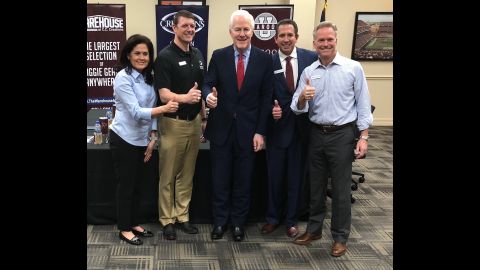
U.S. Senator John Cornyn made two stops in the twin cities on Wednesday.
First, he was the guest of local businessowners for a roundtable discussion of the benefits of federal tax reform.
Hosting the senator and his wife Sandy was Kenny Lawson of C.C. Creations.
Other participants were Thomas Gessner of Gessner Engineering, Claudia Smith of Aggieland Carpet One, and Larry Hodges of Copy Corner.
Senator Cornyn then he went to the Texas A&M campus to be part of an award presentation. System chancellor John Sharp accepted the 2017 Defense Security Service Award for Excellence in Counterintelligence.
Click below to listen to the roundtable discussion with Senator Cornyn and local businessowners, March 28 2018.
032818 Senator Cornyn business roundtable

Sandy Cornyn, and Larry Hodges.
News release from the Texas A&M system:
As America’s foreign rivals ramp up attempts to steal U.S. defense and national security technology, The Texas A&M University System has received the 2017 Defense Security Service Award for Excellence in Counterintelligence.
U.S. Sen. John Cornyn of Texas and Daniel E. Payne, Director of the Defense Security Service, presented the award to Texas A&M System Chancellor John Sharp at a campus ceremony Wednesday.
“Texas A&M System’s work in the intelligence field is public service at its finest,” said Sen. Cornyn, a member of the Senate Intelligence Committee. “By helping the government detect, deter and disrupt the theft of sensitive information by foreign entities, the Texas A&M System’s investments in cybersecurity programs and secure computing help make sure America’s national security stays on the cutting edge.”
Director Payne said the U.S. is now facing the most significant foreign intelligence threat it has ever encountered.
“The technology being stolen from us is being used to threaten our national security, our economic interests and our military,” Director Payne said. “The Texas A&M System takes the protection of these technologies seriously.”
The Texas A&M University System is one of two facilities – out of 13,000 corporate and academic entities – to receive the prestigious award, and it is the only academic organization to earn the award this time.
DSS counterintelligence agents work with corporate and academic entities to thwart attempts by foreign intelligence groups to steal or compromise sensitive data, information and assets. According to the agency’s most recent trend analysis, reports of suspicious activity increased 18 percent in fiscal 2016, and the threats to America’s technological advantage are only expected to increase in the future.
DSS began giving the annual award in 2010 to recognize cleared contractors that best demonstrate the ability to stop foreign theft of U.S. defense and national security technology. It is the highest honor given by the U.S. government in this category and recognizes the Texas A&M System’s extraordinary results in enhancing national security.
Winners of the award, including The Texas A&M University System, have proven to have a continuous and ongoing counterintelligence program that has been integrated throughout the entity and contributes the most to protecting vital national security information.
“We at The Texas A&M University System take our responsibilities seriously, especially when it comes to counterintelligence,” Chancellor Sharp said. “For government agencies or corporations looking to protect their research and information, this national award is just another reason to do business with the Texas A&M System.”
Threats to Department of Defense contractors, including universities, can come in many forms.
Foreign agents can pose as students, faculty, or potential business or research partners who often attend conferences, conventions and trade shows. Their tactics can involve approaching targets to create personal and business relationships in order to gain access to sensitive or classified information. Offers of all-expense paid trips and lucrative employment are becoming increasingly common, according to the DSS report.
Research universities are favored targets.
“Academic solicitation is one of the fastest growing methods of operation used by our adversaries to gain access to our research and technology,” said Dr. Kevin R. Gamache, who leads Texas A&M System’s counterintelligence operations.
The threat is not just within the U.S. American contractors, including faculty, must be careful when traveling overseas because they may become targets for surveillance and theft.
Additionally, foreign entities will continue to attack computer networks with phishing attacks and attempted network intrusions.
The most coveted technologies sought by the country’s rivals are aeronautic systems; command, control, communication and computers; electronics; radars; and armament. The DSS predicts that foreign actors will increasingly target artificial intelligence with the growth of autonomous systems and weapons.
East Asia and the Pacific region as well the Near East lead as sources of suspicious activity against defense contractors, followed by South and Central Asia.
Dr. Gamache and his team remain on the front lines to protect the Texas A&M System as it conducts approximately $330 million in sensitive research for a variety of U.S. government sponsors.

